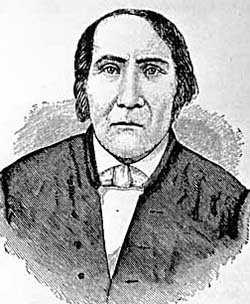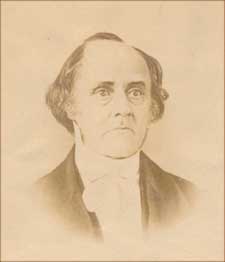Stand Still and See the Salvation of God.
Asa Hillyer was born in Sheffield, Massachusetts, on April 6, 1763. His father was a physician, who served in the army during the Revolutionary War, with young Asa attending by his side in the later years of the War.
Asa entered Yale in 1782, graduating in 1786 at the age of twenty-three. He prepared for the ministry under the guidance of the Rev. Dr. Buell of East Hampton, and completed his studies with Dr. Livingston of the Reformed Dutch Church in New York.
Licensed to preach by the Old Presbytery of Suffolk, Long Island in 1788, he was appointed to supply churches in Connecticut. In 1798, the General Assembly appointed him a missionary to the northern part of Pennsylvania and the western section of New York. His travels lasted for nine weeks and covered some nine hundred miles, preaching almost every day. He was the first minister to ever preach in the region that is now Auburn, New York.
In 1801, Rev. Hillyer was called to serve the First Presbyterian Church in Orange, New Jersey. At that time, this was one of the largest and most influential churches in the State. Hillyer’s ministry was well-received by the congregation, and he remained their pastor for thirty years. In 1833, he resigned his charge and devoted his remaining years to serving as pulpit supply for other churches in the region and to visitation. The Rev. Asa Hillyer died on the evening of August 28th, 1840.
The Rev. James Hoyt wrote a history of this church, titled “The Mountain Society:” A History of the First Presbyterian Church, Orange, N.J. (New York, 1860), and in this history, a full chapter is devoted to Rev. Hillyer’s thirty years as pastor. Among the facets of this chapter, it is notable that there were three marked occasions of revival during Hillyer’s years, 1807-08, 1816-17, and 1832. Of the first of these revivals, there is this striking description of the times prior to the revival:
“But it may not be improper to remark here, that for some time previous to this, everything around assumed a gloomy aspect in regard to evangelical piety. All meetings for prayer except the first Monday in the month, were relinquished. Gambling, horse-racing, intemperance, and dissipation of every kind, threatened all social order with destruction. A moral society had been established for two years, the object of which was the suppression of vice and immorality; but no human effort was able to withstand the torrent of vice which threatened us on every side. At the same time the exertions of Christians were paralyzed; the wise were sleeping with the foolish. This state of things alarmed a few praying people; they agreed to resume a prayer-meeting which had, for the first time in forty years, been relinquished the spring before. This took place about the latter part of July. For a number of weeks not more than twelve or fourteen persons attended; but such fervent and earnest wrestling with God I never witnessed. They prayed as though they saw their children and neighbors standing on the verge of destruction, and that, without an immediate interposition of almighty grace, they were lost for ever.”
“Then in 1807, began a great revival of religion in the town. Ninety-seven joined the church in one day, and about two hundred in all. Fifty, or more, were gathered at Bloomfield.”
“It was soon perceived that our public assemblies were unusually solemn, but no special impression appeared to be made until the third Sabbath in September. In the morning the assembly was addressed on the awful solemnity of a future judgment; and, in the afternoon, from these words: Choose you this day whom ye will serve. This was a day long to be remembered. Such solemnity had not been seen for many years, and many date their first impressions from that day.”
Two things seem remarkable about this account. First, there was the prevailing sinfulness of the wider society in those years. And second, unlike the typical characteristics of a Second Great Awakening “revival”, this occasion was marked by a great solemnity and lack of excitement or passions. Further on in the account, we read that “No attempt was made to work upon the passions…The assembly was unusually solemn. Numbers were evidently pricked to the heart. Their tears, which they made great exertion to conceal, betrayed an awakened conscience…No disturbance was made. All retired in solemn silence.”
Then these last words seem particularly indicative of what we might expect of a true time of revival:
“One evening, after the benediction had been pronounced, the whole assembly stood in solid column. Scarcely an individual moved from his place. Such evidences of deep and heart-felt sorrow I never witnessed before, on any occasion. While all stood in solemn silence, there seemed a great appearance of solemnity than during any part of the previous exercises. Sometimes it seemed we had only to stand still and see the salvation of God. It seemed, indeed, that the Lord was there, and that He gave us an example of His immediate work upon the conscience and heart.
Words to Live By:
If God is going to bring a great turning from sin, it must and can only be His work. It will not be brought about by emotional antics or other man-made contrivances. For our part, may we be earnest in prayerfully waiting upon Him.
Stand in awe, and sin not; commune with your own heart upon your bed, and be still. Selah.
Offer the sacrifices of righteousness, and put your trust in the LORD.
(Ps. 4:4-5, KJV)


